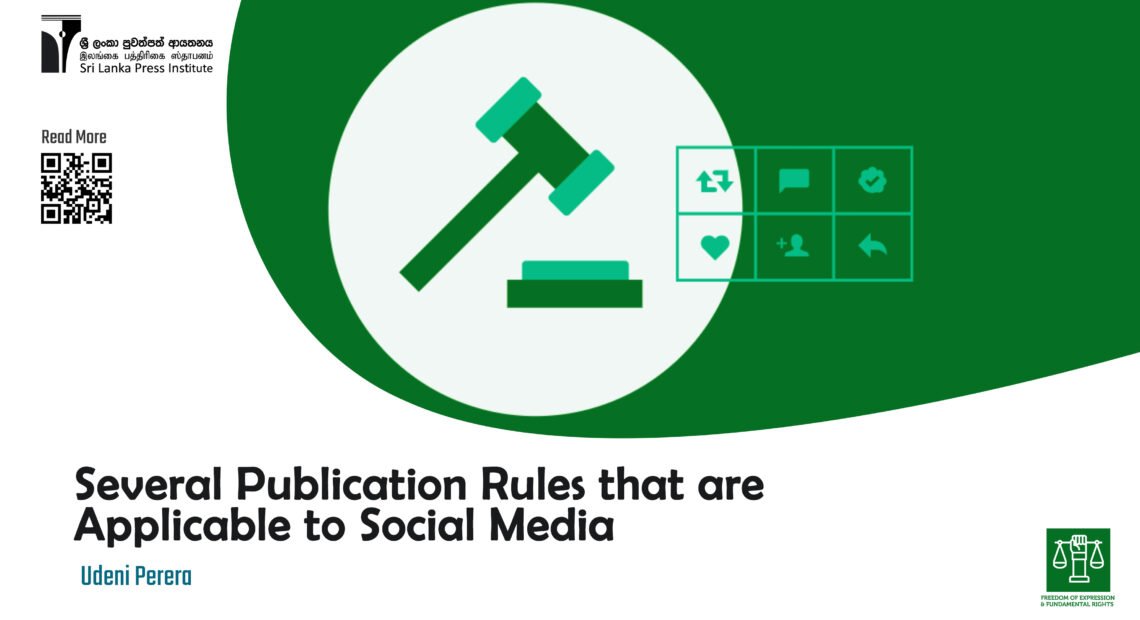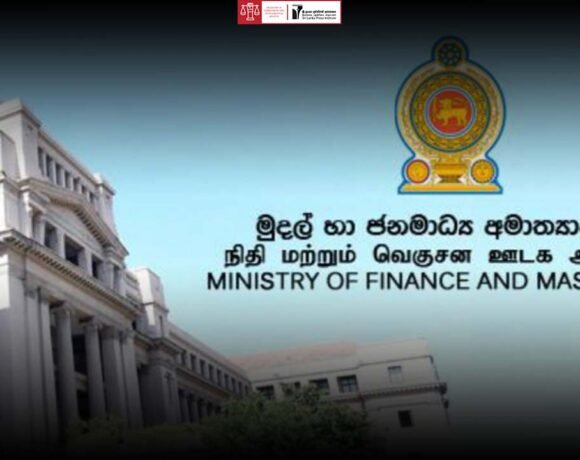
Several Publication Rules that are Applicable to Social Media
Udeni Perera
When considering the services that new media can render to the society, the services of social media cannot be under estimated. It has the ability of socializing news faster than the new media. Anybody who owns a reference account can socialize any information to their desire. There can be seen many instances where people use this freedom in both good and bad ways. In modern day society there are people who use social media to hurt and insult other individuals. Most of them believe that there are no rules and regulations or punishments for such illegal, anti social actions. But in the legal system of Sri Lanka Democratic Socialist Republic, there are many rules and regulations related to the usage of social media.
Unfortunately, many citizens are not aware of these rules and regulations. Not being aware of them is not an excuse for anyone to commit such offences.
Most of the illegal actions in social media are being committed by the groups who do not have a proper understanding about how to behave ethically in social media. Many of such groups cannot even understand that they are engaged in an illegal act because of their ignorance towards the social media regulations.
Facebook, Instergram, whatsApp,Youtube, imo and viber are some of the most used social media plat forms in Sri Lanka. Among them facebook stands out of the other social media plat forms.
Distribution of obscene publications and pictures can be identified as the most common cyber crime that happens in Sri Lanka. Some people add obscene publications and pictures to social media plat forms with the intention of assassinating someone’s character, insulting individuals and to display distorted mentalities. There are many individuals who have become victims of such actions. In such occasions the victimized parties have a right to go before the law.
There are two acts in Sri Lanka related to obscene publications in social media plat forms. The oldest law regarding this is the penal code. According to the 285th sentence in the penal code, displaying obscene books, brochures, papers, magazines, drawings and pictures in social media plat forms is considered as an illegal act. The second law related to this is the 4th Information Act in 1927. According to it, distribution or displaying of obscene drawings, pictures and videos is considered as an illegal act. This applies to the activities happen in all the social media plat forms.
Insulting different religions and disturbing ethnic harmony and national peace are common actions that happen in social media plat forms. Even though some individuals engage in such actions knowingly or unknowingly, it is an illegal action. There are punishments entitled in Sri Lankan law system for such actions.
According to the 3rd sentence of 57th Civil and Political Rights Convention in 2007, spreading war and hatred among nationalities and religious groups is considered as an offensive action. According to the 291st sentence in the penal code, insulting a religion or a religious belief in written or verbal communication is also considered as an offensive action. Furthermore, according to the 2nd sentence in the 41st Religious Insulting Publications Act in 1958, making a publication or display to insult a religion is an offensive action. According to the 48th Prevention of Terrorism Act in 1979, spreading hatred among nationalities is also an offensive action. Therefore, spreading anything that arouses racism in the society in social media plat forms is also considered as an offensive action. As the closest example which shows this scenario, the argumentative posts shared in face book related to the conflicts between people in different provinces in Sri Lanka can be taken. Some spread prejudiced posts claiming they are from down south and some others try to conflict against it by claiming that western province is the best. Even though people publish these for fun and entertainment purposes, it is clear that such actions are illegal too.
It is obvious that people tend to present their opinions on social media plat forms when they see a crime in the society. Moreover they also publish different opinions about the criminals and other people who are considered as criminals. According to the penal code, some of such actions are also considered as offensive. According to the 20th sentence of 34th Act in 2005, it is an offence to reveal the identity of the victim party while the case is being heard in courts. But such actions commonly happen in social media plat forms. In the rape case of a 5 year old girl in Kotadeniyawa in 2015, her own father and one of the neighbors were made guilty by social media as well as some of the major media authorities even before the case was heard in the courts.
According to the 24th Computer Crimes Act in 2007, people can take legal actions regarding the illegal incidents and activities happen in social media plat forms. One of the major illegal acts in social media platforms is plagiarism. Some people extract sections of literary work of others without permission and publish in social media plat forms. Even though some people try to justify that it is not an offence, according to the 6th sentence in the 36th National Intellectual Property Act in 2003, extracting a section or a full text without having permission from the author is considered as a punishable offence. It is a violation of intellectual property rights.
In present, insulting certain individuals in social media platforms can be commonly seen. Mostly women and well known personalities in the society face this problem. If a person publishes something to insult another individual or a group, it can be lead to a defamation case.
Every individual should be responsible when they publish their opinions, articles, videos and photographs in social media plat forms. It is important for everyone to impose a self-censorship when they use social media. As modern media is being overlooked by social media in the prevailing society, it is important to consider whether people follow media rules and regulations properly.








